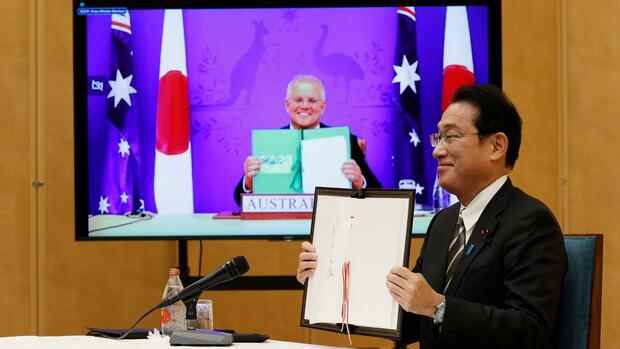Tokyo The US, Japan and Australia want to face China’s growing military power as allies. Last week, not only Japan and the USA agreed on closer cooperation. Japan and Australia also signed a Reciprocal Access Agreement (RAA) on Thursday to facilitate the exchange and deployment of troops.
In an online summit meeting with Australian Prime Minister Scott Morrison, Japan’s Prime Minister Fumio Kishida described the RAA as “a groundbreaking agreement that takes security cooperation between Japan and Australia to a new level”. Because Australia is only the second country after Japan’s protecting power, the USA, with which Japan has agreed such an agreement.
This also laid the foundation for the first multilateral alliance of US allies in Asia. Unlike in Europe, the USA does not have an alliance network in Asia. Instead, there are only a number of bilateral alliances with countries such as Japan, Korea, Australia and the Philippines, although these are not allied with one another.
The addressee was also no secret, although the Australian Prime Minister Morrison did not directly mention the actual opponent in his statement. The agreement is seen as a further step by the US allies against China.
Top jobs of the day
Find the best jobs now and
be notified by email.
Or as Morrison put it: Both nations demonstrated their will to counter common strategic security risks together and to contribute to a “safe and stable Indo-Pacific region”.
Control of sea connections in Southeast Asia
In doing so, Morrison was alluding to China’s increasingly aggressive territorial claims. The People’s Republic not only claims the democratically ruled Taiwan as its own territory, but also demands rock islands controlled by Japan and, above all, a large part of the South China Sea, although contrary to international law.
China is fueling concerns that it controls important sea connections in Southeast Asia – and can interrupt them at its own discretion. This would not only jeopardize Europe’s trade routes to East Asia, but above all those of Japan and South Korea, which are dependent on raw material and food imports.
Japan is fighting with China over the archipelago.
(Photo: AP)
American and Japanese warships have therefore been cruising through the sea area for a long time to set an example for free shipping and against China’s claims. However, Beijing’s aggressiveness has now also startled European countries. Not only France, Great Britain and the Netherlands have sent warships to the Indo-Pacific region in recent years to demonstrate the right to unhindered access to international waters, but even Germany.
Activism is triggered by China’s growing military power. The US has long been urging its allies to become more militarily active themselves and to join forces in order to increase the counterweight.
The so-called Quad, a discussion forum between the USA, Japan, Australia and India, was a step on the way. Another milestone for a multilateral alliance last year was an agreement between Australia, Great Britain and the USA (Aukus).
Now Australia has disregarded concerns that have so far prevented the deal with Japan for seven years. In contrast to Australia, Japan imposes the death penalty and does not want to exempt Australian soldiers from it. In addition, Japan has been negotiating another RAA with Great Britain since last year.
Japan is starting to rearm
At the same time, Japan is beginning to rearm and play a more active role in the alliance with the United States. For example, the Ministry of Defense has converted helicopter carriers into small aircraft carriers and is moving closer to Taiwan. In addition, the government is considering purchasing missiles that can reach China and North Korea in order to deter their neighbors more strongly from nuclear and conventional attacks on Japan.
Closer cooperation in operations and research is also being planned, an online meeting of the American and Japanese foreign and defense ministers made clear on Friday. “If Japanese and American researchers bring their complementary strengths to bear, we can outperform everyone,” said US Secretary of State Antony Blinken.
Closer cooperation with the US in operations and research is also being planned, according to US Secretary of State Blinken,
(Photo: Reuters)
At the same time, experts and politicians in the region are now calling for deterrence to be supplemented by armament with multilateral talks. Unlike in Europe during the Cold War, there is a lack of solid, trust-building forums to prevent accidental wars.
In Japan, the coalition partner of Kishida’s Liberal Democratic Party, the New Justice Party, suggested earlier this year that Japan should take the initiative for a permanent exchange in Asia. In China, Zhang Tuosheng, director of the Institute for International and Strategic Studies at Beijing University, spoke out in favor of trilateral talks in an article.
“China and Japan should also consider jointly promoting the trilateral security dialogue between China, Japan and the US at an appropriate time and discussing many security issues in order to reduce misunderstandings and misjudgments,” Zhang wrote.
More: The growing personality cult around Xi Jinping is a danger for China – and the world.
